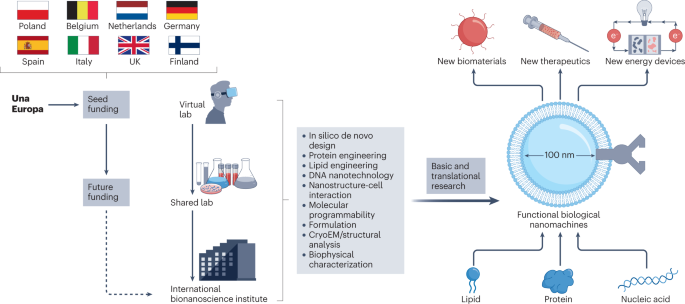Play all audios:
The UNANO consortium consists of laboratories from eight European research universities that explore biomolecules as building blocks for the assembly of nanostructures and nanomachines.
UNANO aims at uniting bionanotechnology researchers across Europe and transcending disciplinary boundaries to synergize research impact and explore applications of bionanotechnology. Access
through your institution Buy or subscribe This is a preview of subscription content, access via your institution ACCESS OPTIONS Access through your institution Subscribe to this journal
Receive 12 digital issues and online access to articles $119.00 per year only $9.92 per issue Learn more Buy this article * Purchase on SpringerLink * Instant access to full article PDF Buy
now Prices may be subject to local taxes which are calculated during checkout ADDITIONAL ACCESS OPTIONS: * Log in * Learn about institutional subscriptions * Read our FAQs * Contact customer
support REFERENCES * Jumper, J. et al. Highly accurate protein structure prediction with AlphaFold. _Nature_ 596, 583–589 (2021). Article Google Scholar * Sletten, E. M. & Bertozzi,
C. R. Bioorthogonal chemistry: fishing for selectivity in a sea of functionality. _Angew. Chemie Int. Ed._ 48, 6974–6998 (2009). Article Google Scholar * Dunn, K. E. The business of DNA
nanotechnology: commercialization of origami and other technologies. _Molecules_ 25, 377 (2020). Article Google Scholar * Douglas, S. M., Bachelet, I. & Church, G. M. A logic-gated
nanorobot for targeted transport of molecular payloads. _Science._ 335, 831–834 (2012). Article Google Scholar * Stupka, I. et al. Chemically induced protein cage assembly with
programmable opening and cargo release. _Sci. Adv._ 8, (2022). * Heddle, J. et al. Artificial protein cage delivers active protein cargos to the cell interior. _Biomacromolecules_ 22,
4146–4154. * Khmelinskaia, A., Wargacki, A. & King, N. P. Structure-based design of novel polyhedral protein nanomaterials. _Curr. Opin. Microbiol._ 61, 51–57 (2021). Article Google
Scholar * Malay, A. D. et al. An ultra-stable gold-coordinated protein cage displaying reversible assembly. _Nature_ 569, 438–442 (2019). Article Google Scholar * Leman, J. K. et al.
Macromolecular modeling and design in Rosetta: recent methods and frameworks. _Nat. Methods_ 17, 665–680 (2020). Article MathSciNet Google Scholar * Helsen, C. et al. Exploiting ligand
binding domain dimerization for development of novel androgen receptor inhibitors. _Mol. Cancer Ther._ 21, 1823–1834 (2022). Article Google Scholar Download references ACKNOWLEDGEMENTS We
thank D. Mossakowska Earnshaw for constructive feedback on the manuscript and for her contribution to the establishment and ongoing development of the UNANO project. AUTHOR INFORMATION
AUTHORS AND AFFILIATIONS * Malopolska Centre of Biotechnology, Jagiellonian University, Krakow, Malopolska, Poland Jonathan G. Heddle * Institute for Bioengineering, School of Engineering,
University of Edinburgh, Edinburgh, UK Katherine E. Dunn Authors * Jonathan G. Heddle View author publications You can also search for this author inPubMed Google Scholar * Katherine E. Dunn
View author publications You can also search for this author inPubMed Google Scholar CORRESPONDING AUTHOR Correspondence to Jonathan G. Heddle. ETHICS DECLARATIONS COMPETING INTERESTS
J.G.H. is named as an inventor on four pending or granted patent applications relating to artificial protein cages and one pending patent application related to DNA origami filed by
Jagiellonian University with patent application numbers PCT/IB2018/056150, LU 102569, LU 102572, LU 102571 and PCT/EP2022/075047. J.G.H. is also the founder of and holds equity in nCage
Therapeutics LLC, which aims to commercialize protein cages for therapeutic application. K.E.D. is named as an inventor on a patent application (GB2207592.3) filed by the University of
Edinburgh for a method to use DNA nanoswitches to control gene expression electrically. ADDITIONAL INFORMATION RELATED LINKS BIONANO SYMPOSIUM: www.bionanomeeting.org PROTEIN DATA BANK:
www.rcsb.org UNA EUROPA: www.una-europa.eu UNANO PROJECT: www.unano.org RIGHTS AND PERMISSIONS Reprints and permissions ABOUT THIS ARTICLE CITE THIS ARTICLE Heddle, J.G., Dunn, K.E. The
UNANO consortium aims at uniting bionanotechnology research in Europe. _Nat Rev Bioeng_ 1, 690–691 (2023). https://doi.org/10.1038/s44222-023-00080-2 Download citation * Published: 02 June
2023 * Issue Date: October 2023 * DOI: https://doi.org/10.1038/s44222-023-00080-2 SHARE THIS ARTICLE Anyone you share the following link with will be able to read this content: Get shareable
link Sorry, a shareable link is not currently available for this article. Copy to clipboard Provided by the Springer Nature SharedIt content-sharing initiative

